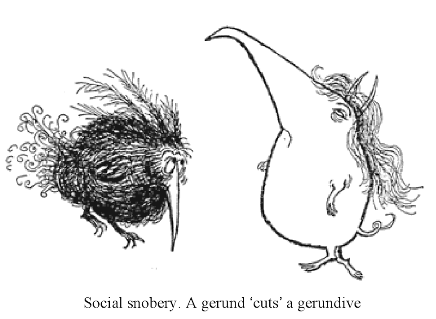Gerundive: Difference between revisions
Jump to navigation
Jump to search
Amwelladmin (talk | contribs) No edit summary |
Amwelladmin (talk | contribs) No edit summary |
||
| (6 intermediate revisions by the same user not shown) | |||
| Line 1: | Line 1: | ||
A form of a | {{a|plainenglish|[[File:Gerund_cuts_gerundive.PNG]]}}A [[gerundive]] is a form of a [[Latin]] [[verb]], having the (declinable) ending ''-ndus'' which functions as an [[adjective]] meaning ''“that should or must be done”''. | ||
''There is no [[gerundive]] in English; the closest you get is a [[passive]] [[infinitive]] like “books to be read”, combining a [[transitive verb]] and its object with a sense of obligation. But wouldn’t you just use the [[active]] infinitive and avoid that ugly passive: "books to read".'' | |||
*[[quod erat demonstrandum]] — ''because that is the very thing one seeks to prove | |||
===[[Latin]] examples === | |||
*[[quod erat demonstrandum]] — ''because that is the very thing one seeks to prove''; | |||
*[[mutatis mutandis]] — ''changed in ways that must be changed''. | *[[mutatis mutandis]] — ''changed in ways that must be changed''. | ||
See also [[gerund]], which is capable of social snobbery.<br /> | See also [[gerund]], which is capable of social snobbery.<br /> | ||
{{c|Egg}} | {{c|Egg}} | ||
Latest revision as of 13:30, 14 August 2024
|
Towards more picturesque speech™
|
A gerundive is a form of a Latin verb, having the (declinable) ending -ndus which functions as an adjective meaning “that should or must be done”.
There is no gerundive in English; the closest you get is a passive infinitive like “books to be read”, combining a transitive verb and its object with a sense of obligation. But wouldn’t you just use the active infinitive and avoid that ugly passive: "books to read".
Latin examples
- quod erat demonstrandum — because that is the very thing one seeks to prove;
- mutatis mutandis — changed in ways that must be changed.
See also gerund, which is capable of social snobbery.
